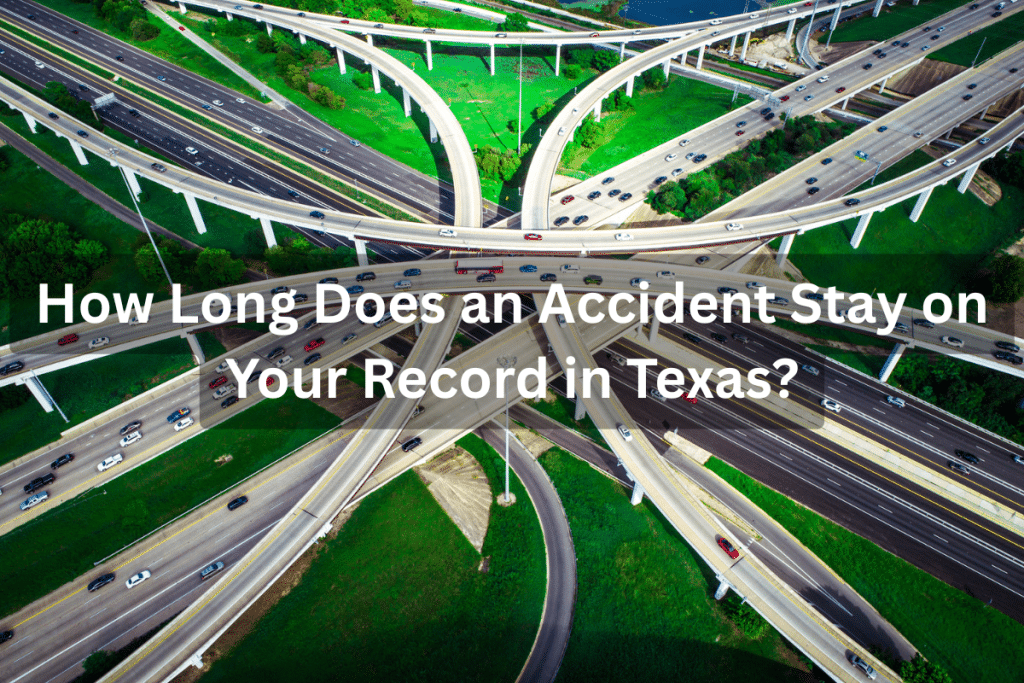If you’ve been involved in a car accident in Texas, one of your first concerns might be how long that incident will stay on your record—and how it could affect your insurance rates, driving privileges, and legal standing. The answer depends on which “record” we’re talking about. In Texas, an accident can show up on multiple records, including your driving record, insurance history, and police or court records. Each has its own timeline.
Here’s what you need to know.
Texas Driving Record: 3 to 5 Years
In Texas, most car accidents will stay on your driving record for three years from the date of the crash. This applies whether you were at fault or not.
However, if the accident led to a serious violation—such as a DUI, reckless driving, or leaving the scene—the offense can stay on your record for five years or more, depending on the nature of the violation.
The Texas Department of Public Safety (DPS) maintains your official driving record. Employers, insurers, and courts can access this record, and it may influence your driving privileges or employment opportunities—especially for jobs that require a clean driving history.
Texas offers different types of driving records (Type 1 through Type 3A), but the Type 3A is the version most commonly used by insurers and employers. This version shows accidents and violations from the past three years in most cases.
Insurance Record: Up to 5 Years
Insurance companies maintain their own records, and they generally track accidents for three to five years. This timeline can vary by provider, but five years is a common benchmark.
Even if the accident isn’t your fault, insurers may still record it and use it when assessing your risk level. If you were found to be at fault, you can expect a noticeable hike in premiums. Some insurers may even choose not to renew your policy, depending on your history.
On the flip side, most insurance companies offer accident forgiveness programs or allow rates to decrease over time with a clean record. If you maintain a safe driving history after the incident, your premiums can return to normal in a few years.
Police and Court Records: Indefinitely
If a police report was filed for the accident, that report becomes a matter of public record. In most cases, police reports do not automatically disappear. They can be accessed indefinitely unless sealed by court order or expunged under special circumstances.
Similarly, if your accident led to a citation or court case, that record can remain part of the public record for many years—or even permanently. This is particularly relevant if the case involved a criminal charge, such as DUI or vehicular assault.
In Texas, expungement or non-disclosure orders are required to seal or limit access to these types of records, and they are only granted under specific legal conditions.
Commercial Drivers Face Stricter Standards
If you hold a Commercial Driver’s License (CDL), the rules are stricter. Even minor accidents can have a lasting impact. The Federal Motor Carrier Safety Administration (FMCSA) requires reporting of all accidents involving commercial vehicles. These records are maintained in federal databases and can affect your employment and certification.
In many cases, CDL drivers face longer retention periods on their records, and even a single at-fault accident may disqualify them from certain jobs or routes.
Can You Remove an Accident From Your Record?
In general, you cannot remove an accident from your driving or insurance record unless it was logged in error. If you believe a mistake was made—for example, if you were listed as the at-fault driver when you weren’t—you can request a correction through the Texas DPS or your insurance company, depending on where the record appears.
For court or police records, expungement is possible only under limited circumstances, typically when charges were dropped or you were found not guilty. You’ll need to file a legal petition and go through the court system to request record sealing or expungement.
What You Can Do Moving Forward
While you can’t erase most accidents from your record, you can reduce their long-term impact:
- Drive safely: Avoid additional violations or accidents.
- Take defensive driving courses: In some cases, Texas courts or insurers may allow these to remove minor violations or reduce points.
- Shop around for insurance: After an accident, different companies may rate your risk differently. You may find better rates elsewhere.
- Request your driving record: You can order your Texas driving record online through the DPS to see what’s on it.
How Long It Really Follows You
Accidents usually stay on your Texas driving record for three years. They can affect your insurance rates for up to five years. Police and court records may be permanent unless legally sealed. CDL holders face stricter, longer-lasting consequences. Correction or removal is possible only in specific cases.
Knowing what to expect can help you make smart choices after an accident. If you’re dealing with legal consequences, insurance disputes, or questions about your driving record, it may be worth consulting an Austin truck accident attorney who can help you understand your rights and options under Texas law.


